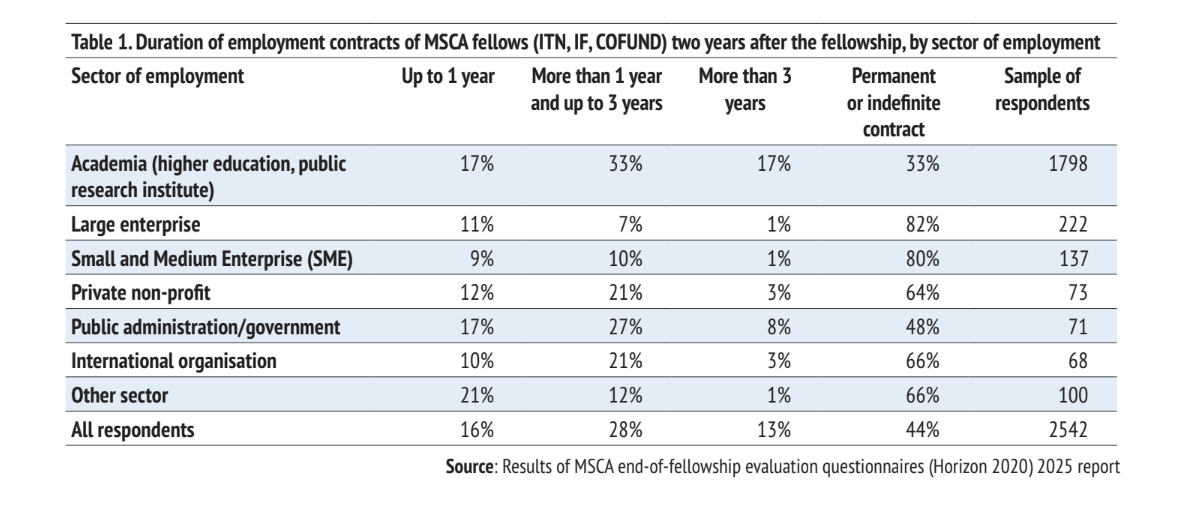Newsletter
Supporting researchers’ career development is one of the core objectives of the Marie Skłodowska-Curie Actions (MSCA). Based on surveys of former fellows, this piece sheds some light on the career paths of MSCA researchers after the fellowship. Their experience highlights the positive impact of the MSCA, but also the different challenges they may encounter and how they are being addressed.

Anouk Lafortune
Anouk Lafortune is a Policy Officer in the MSCA Unit in the Directorate General for Education, Youth, Sport, and Culture at the European Commission (DG EAC) at the European Commission. She notably works on the MSCA Postdoctoral Fellowship action and on more horizontal topics for the programme, including academia-business cooperation, research assessment, and the end-of-fellowship surveys. Before joining the Commission, she was an early-career researcher and holds a doctoral degree in social sciences.
As a research and training programme, the MSCA supports researchers’ training, skills, and career development, notably through international, intersectoral, and interdisciplinary mobility and collaborations.
Since 2018, all researchers participating in MSCA projects have had to fill in two questionnaires after their fellowship. To date, over 25,000 participants of Horizon 2020 (H2020) projects have completed an evaluation questionnaire immediately after the end of their MSCA fellowship, and 5,000 have submitted the follow-up questionnaire two years later.
These questionnaires gather feedback from former fellows on their experience with the programme and on the impact the fellowship has had on their skills and professional development. They also provide data on the careers of former fellows, in particular those who participated in doctoral programmes (H2020 MSCA ITNs), postdoctoral individual fellowships (H2020 MSCA IFs), or co-funded programmes (COFUND). These figures offer valuable insights both for the programme and for current and future fellows on career prospects after their MSCA fellowships.

Annelies Van de Ven
Annelies Van de Ven recently joined the European Commission’s MSCA Unit as a Policy Officer responsible for COFUND, Open Science and Synergies. Prior to commencing her current role, she was an FNRS-funded postdoc working at the inter-section of archaeology and collections management. Her move to the policy role was motivated by her work as a representative of the scientific staff of UCLouvain and as a slow science advocate co-organising the inter-university doctoral school on the future of academic research.
MSCA training and relevance for career development
The results of the questionnaires indicate that MSCA training equips researchers with a wide range of both scientific and transferable skills that they can use in their research careers afterwards. Among the skills developed through the fellowships, former fellows most often report research knowledge and expertise, the ability to build international and intersectoral networks, and communication and presentation skills. 83% of former fellows also report acquiring project management skills through their MSCA fellowship.
Nearly all former fellows (~99%) report using the skills they acquired during the MSCA fellowships in their subsequent careers. These results suggest that the skills acquired are relevant and support the fellows in their career development.
The programme notably encourages fellows to gain experience in sectors outside academia. It is estimated that around one third of fellows have spent time in non- academic organisations during their MSCA fellowship. Among those, almost all (95%) declare that their experience benefited their career, including 54% who consider that their non-academic experience was to a very large or large extent beneficial for their career.

Career trajectories of Marie Skłodowska-Curie Fellows across sectors
Sectors of employment of former fellows
Most former doctoral and postdoctoral fellows continue to work in research and innovation at least two years after their MSCA fellowship, with 90% of employed fellows working in a research-related field.
While most of them (73%) pursue research careers in academia, many also end up working in other sectors, including companies, public administration, and civil society organisations.
The share of former fellows working in different sectors of employment varies according to their career stage. Former doctoral researchers are notably more likely to work outside academia (i.e., 56% of former ITN doctoral fellows), compared to more experienced researchers who received an MSCA individual fellowship, of whom 86% were still in academia two years later.
Types of contracts by sector
The table below presents the duration of employment contracts of former fellows working in different sectors two years after the MSCA fellowship. On average, 44% of former fellows had permanent or indefinite contracts within two years after their MSCA fellowship. The results, however, indicate that the types of contracts tend to vary according to the sector, with academia notably having the highest share of former fellows under short-term and temporary contracts.
On average, around 33% of former MSCA doctoral and postdoctoral fellows working in academia had a permanent or indefinite contract two years after their fellowship. The share was higher among postdoctoral researchers (43%) than among former doctoral fellows (13%).
This is in stark contrast with the shares in other sectors: for former fellows working in the private for-profit sector, 80% or more are in permanent or indefinite contracts, and the share is over 60% for most other non- academic sectors.

Table 1. Duration of employment contracts of MSCA fellows (ITN, IF, COFUND) two years after the fellowship, by sector of employment
These results reflect the low job security in research careers in Europe particularly affecting early-career researchers in academia. The issue of precarity in research careers has been the object of several recent studies, for example, the OECD’s Reducing the precarity of academic research careers report, CESAER’s Research Careers Survey and the Initiative for Science in Europe (ISE’s paper) Towards establishing funding schemes that promote academic Job Security for Early Career Researchers.
As a response to this issue of precarity, the MSCA is launching a Choose Europe for Science pilot call in the final months of 2025. This pilot will aim to increase the attractiveness of European research careers by encouraging research organisations, including universities, to offer long-term career prospects as well as excellent working conditions to researchers at the postdoctoral level. These criteria will be part of the evaluation of proposals alongside research objectives, recruitment procedures, and career development opportunities during the project. Just like in all MSC actions, the programmes selected under this call will be open to researchers of any nationality, based within or outside Europe, with the objective to retain promising talents in Europe and attract new ones from abroad.
To find out more about former fellows’ experiences and careers after MSCA, read the published MSCA end-of-fellowship questionnaire annual reports.
To find out more about our upcoming Choose Europe for Science call, check out the dedicated page on the MSCA website.
NOTE: Proposals are to be made at the level of institutions. Projects will be selected in 2026 and will then issue their own vacancies for researchers.
Anouk Lafortune
MSCA Unit, Directorate General for Education,
Youth, Sport and Culture, European Commission
anouk.lafortune1@ec.europa.eu
Annelies Van de Ven
MSCA Unit, Directorate General for Education,
Youth, Sport and Culture, European Commission
Annelies.VAN-DE-VEN@ec.europa.eu
References
CESAER (2024). Research careers: A critical choice for Europe. Results, insights and recommendations from CESAER Research Career Survey 2024. Available: https://www.cesaer.org/content/5-operations/2024/20241211-research- careers-report/20241211-cesaer-research-careers-report.pdf
European Commission (2025). Results of MSCA end of fellowship evaluation questionnaires (Horizon 2020). Available: https://op.europa.eu/en/publication-detail/-/publication/81fb9a26-2a2d-11f0-8a44-01aa75ed71a1
European Commission (2025). Horizon Europe Work Programme 2023-2025. Marie Skłodowska-Curie Actions. European Commission Decision C(2025) 2779 of 14 May 2025. Available: wp-2-msca-actions_ horizon-2023-2024_en.pdf
European Commission (2025). Choose Europe for Science. Available: https://marie-sklodowska-curie-actions. ec.europa.eu/actions/choose-europe-for-science
ISE (2024). Towards establishing funding schemes that promote academic job security for early career researchers. Available: https://initiative-se.eu/wp-content/uploads/2024/08/ISE-WG-RC-Job-Security-def.pdf
OECD (2021). Reducing the precarity of academic research careers. OECD Science, Technology and Industry Policy Papers, No 113. Available: https://www.oecd.org/content/dam/oecd/en/publications/reports/2021/05/reducing- the-precarity-of-academic-research-careers_2d4e2194/0f8bd468-en.pdf
















